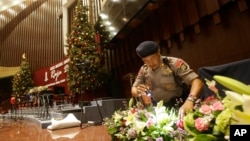Security forces are on high alert in several countries this Christmas because of concern that radical Muslim groups could attack churches or Christian communities.
In Indonesia, the world's largest Muslim-majority country, security officials said they had deployed 80,000 police officers and 65,000 military personnel across the country to deter any acts of violence against Christian targets.
Indonesian Chief of Police General Sutarman, who uses only one name, said he hoped Christmas and New Year celebrations would be free of problems.
"The security measures covered activities inside churches, activities at entertainment areas, tourist spots," he said. "As a whole, we try to anticipate what could happen as best as possible."
The announcement came as a car was bombed outside a church in far eastern Ambon province Wednesday. The attack did not injure anyone, and the suspects were still at large.
Meanwhile, many in Pakistan's Christian community are taking a low-key approach to the holiday following the Dec. 16 Taliban attack at a school in Peshawar that left 148 people dead.
One Christian resident in northwestern Pakistan, who did not want to be identified, told VOA that celebrations would be toned down out of respect for the dead: "We will celebrate our Christmas with simplicity. We will remember the slain students and others in our prayers."
Security has been increased in Kenya, which has experienced a number of attacks on passenger buses by the Somali militant group al-Shabab, as well as common robbers.
Hundreds of thousands of Kenyans are traveling to their home areas this week. Martabel Auma Owalo told VOA that her trip from Mombassa went without incident.
"There were many roadblocks on the way," she said. "And there was no incident. The passengers were comfortable and the security was good."
In northern Nigeria, officials in Borno state announced a five-day ban on all kinds of vehicular activity. The move was aimed at curbing attacks by the radical Islamist group Boko Haram.
This report was produced in collaboration with the VOA Indonesian, Deewa and Swahili services. Andy Lala contributed from Jakarta, and Haimatullah Sarhady contributed from Peshawar.




